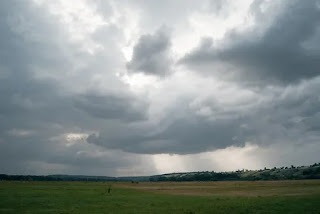Sana Thakkar Week 15 - Déjà Vu
I can recall exploring a new city for the first time, where the streets and shops feel familiar to an extent where I am certain I have visited before, and the exact moment is ingrained into my mind, stored as a past memory, conflicting the present moment with illusions of the past. This phenomenon is referred to as déjà vu, which according to Merriam Webster, is the illusion of remembering scenes and events when experienced for the first time".
Scientists and researchers do not possess a definitive answer to the mysteries of déjà vu, but there are multiple hypothesis. One prevalent discussion is that when déjà vu occurs, two different streams of awareness clash, leading to split perception where the brain processes an event twice, and the second perception is consciously experienced. While only one type of déjà vu is widely acknowledged, there are multiple further in-depth terms that describe specific varieties of this feeling such as déjà entendu (already heard), déjà éprouvé (already attempted), déjà fait (already done), déjà pensé (already thought), déjà raconté (already recounted), déjà senti (already felt emotionally), déjà su (already known intellectually), déjà trouvé (already met), déjà vécu (already lived through), and déjà voulu (already wanted). So, people who do not identify with experiencing essentially déjà vu, may identify with its variants.
When I was younger, I believed my déjà vu was a sign of superpowers or a component of my developing psychic abilities, none of which are accurate. In fact, déjà vu is the result of a lack of sleep along with stress, and intensely frequent episodes are linked to brain tumors, dementia, head trauma, and seizures. Despite these startling terms, déjà vu is experienced by 97% of people, and prevalent in around two-thirds of the population.
Overall, déjà vu is an elusive concept that blends the distinctions between the past and the present. It prompts us to question our reality, while exploring the riveting depths of our conscious, transcending the ordinary, and offering a mysterious insight into our conscious.



Hi Sana! Your analysis on “déjà vu” was interesting and I didn’t know there were so many varieties of the phrase, all using the same French past participle stems. I’ve learned about the phrases “déjà vu” and “déjà su” before because I took four years of French, but I’m surprised that we were not taught seemingly common French phrases such as “déjà fait” and “déjà senti.” The phrase “déjà vu” isn’t the only phrase used in English that stems from French. Phrases such as entrepreneur, menu, elite, solicitor, and literature are all words that are commonly used today that have French origins. For instance, the word “literature” is “littérature” in French and the word “crayon” is often used to describe a pencil in French, although this was an English influence on French. Words such as “rendezvous” and “chauffeur” are also utilized in English, and these words are directly influenced from French. The idea of “déjà vu” is something that was widely explored by French writers such as Hemingway, Victor Hugo, and Alexandre Dumas which is why the phrase is especially popular when discussing literature and art made during the Romantic Period. Déjà vu is also an extremely popular occurrence since, as you stated in your article, over 97% of people experience déjà vu in their lives.
ReplyDeleteHi Sana! I never knew that different versions of deja vu exist and that they all describe similar, yet simultaneously vastly different experiences. I also didn’t know that deja vu can be a result of lack of sleep, brain tumors, dementia, and head trauma, which is slightly concerning since I myself have experienced deja vu before in a variety of circumstances (although I do understand that these are the causes in a select few cases and not all of them). It’s interesting that scientists don’t have a complete understanding of the causes of deja vu and the reasoning behind why one may experience it. The fact that they are often unable to explain not only deja vu, but also the variety of alternatives that you mentioned show how much more we have to learn about the brain and its functions.
ReplyDeleteHey Sana! I never knew there were so many variants of deja vu or the origin of the world. Whenever I think of deja vu I think of that one Olivia Rodrigo song about if her ex gets deja vu when with his new girl, and I have based my definition of the phrase off that song. However after reading your blog this week, I have learned that this is more than just a silly feeling and originates from being severely ill. If I think about it more, I start to understand why deja vu really happens, for instance when we had to stay in what used to be Mr. Winiger's room I got some flashbacks to when I was suffering in Chem Honors last year but it was nothing unsettling. On the other hand real deja vu can traumatize and alter people's minds over the hallucination of doing the same thing on loop.
ReplyDeleteHi Sana! I really enjoyed reading your blog and I think that your topic is really interesting! I like how you clarified that there are multiple types of deja vu's that exist, because I did not know that before. The human brain truly is such a powerful tool, and the fact that different types of trauma and deficiencies can translate to deja vu is so interesting. I personally have found myself experiencing deja vu quite a few times and whenever it happens I feel so confused and frustrated as to why I feel like I have lived through the exact situation before.
ReplyDelete